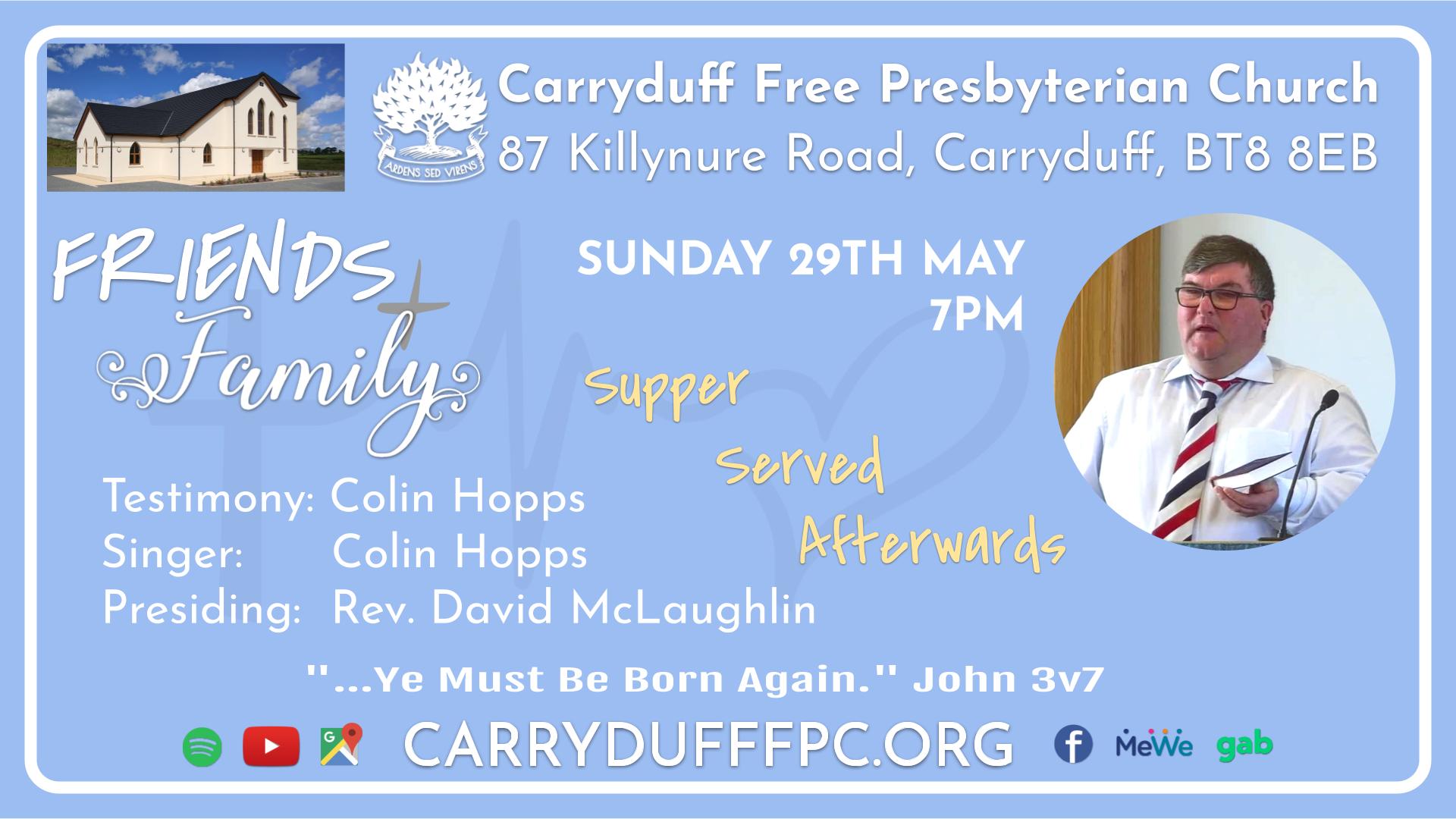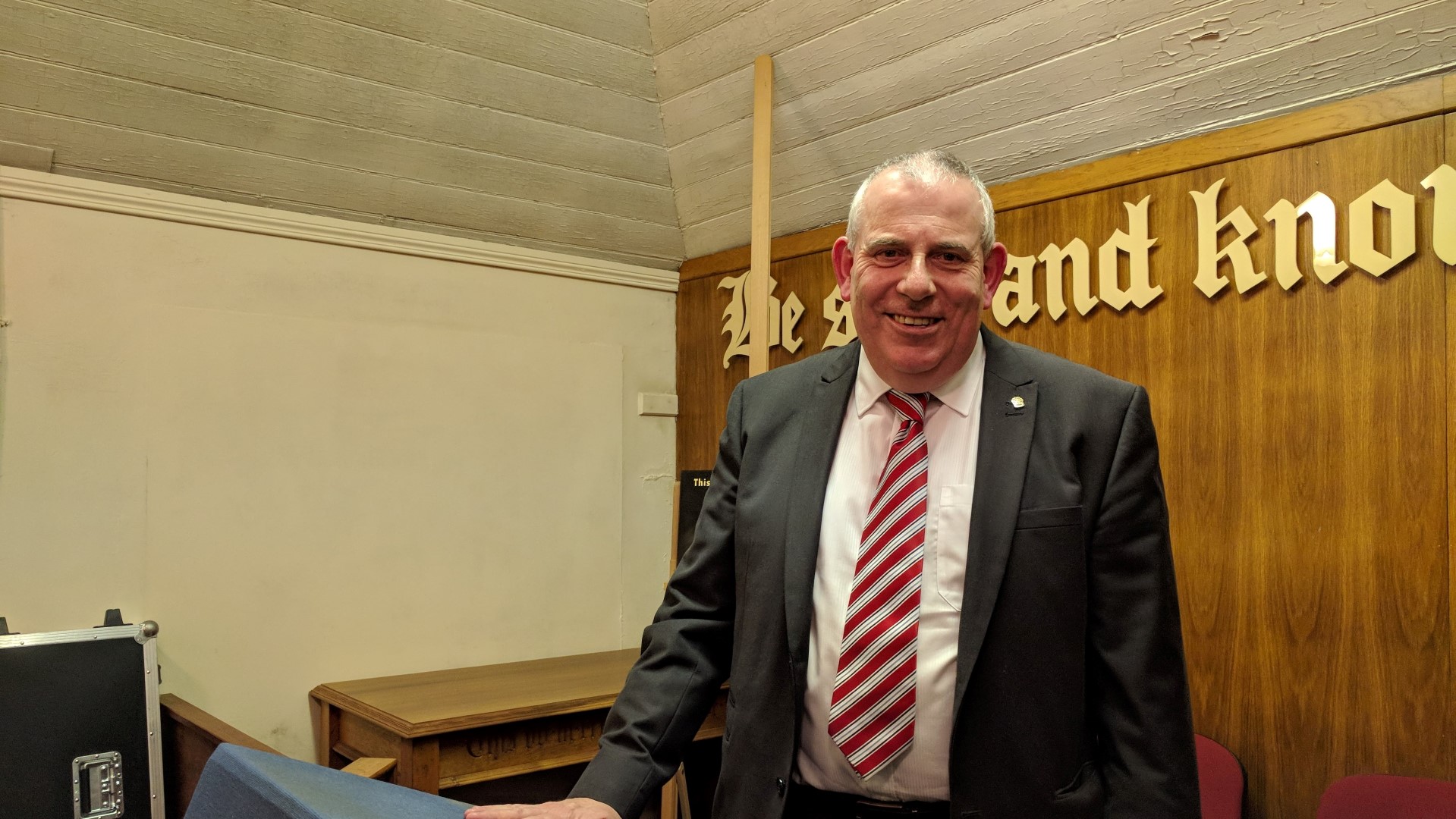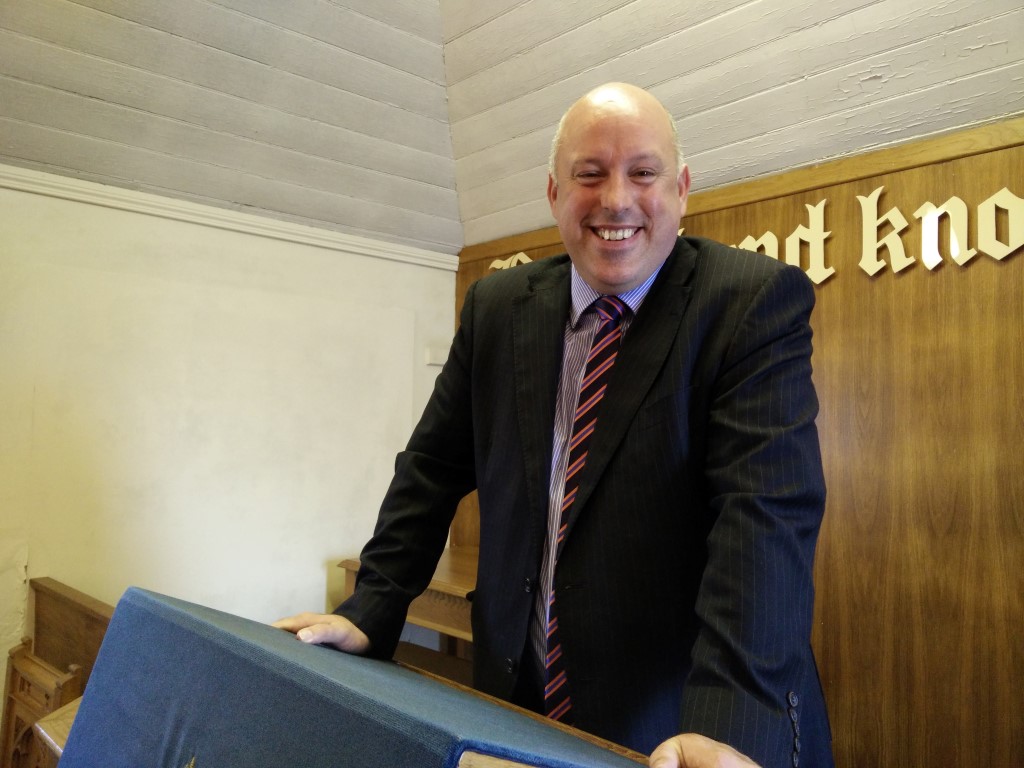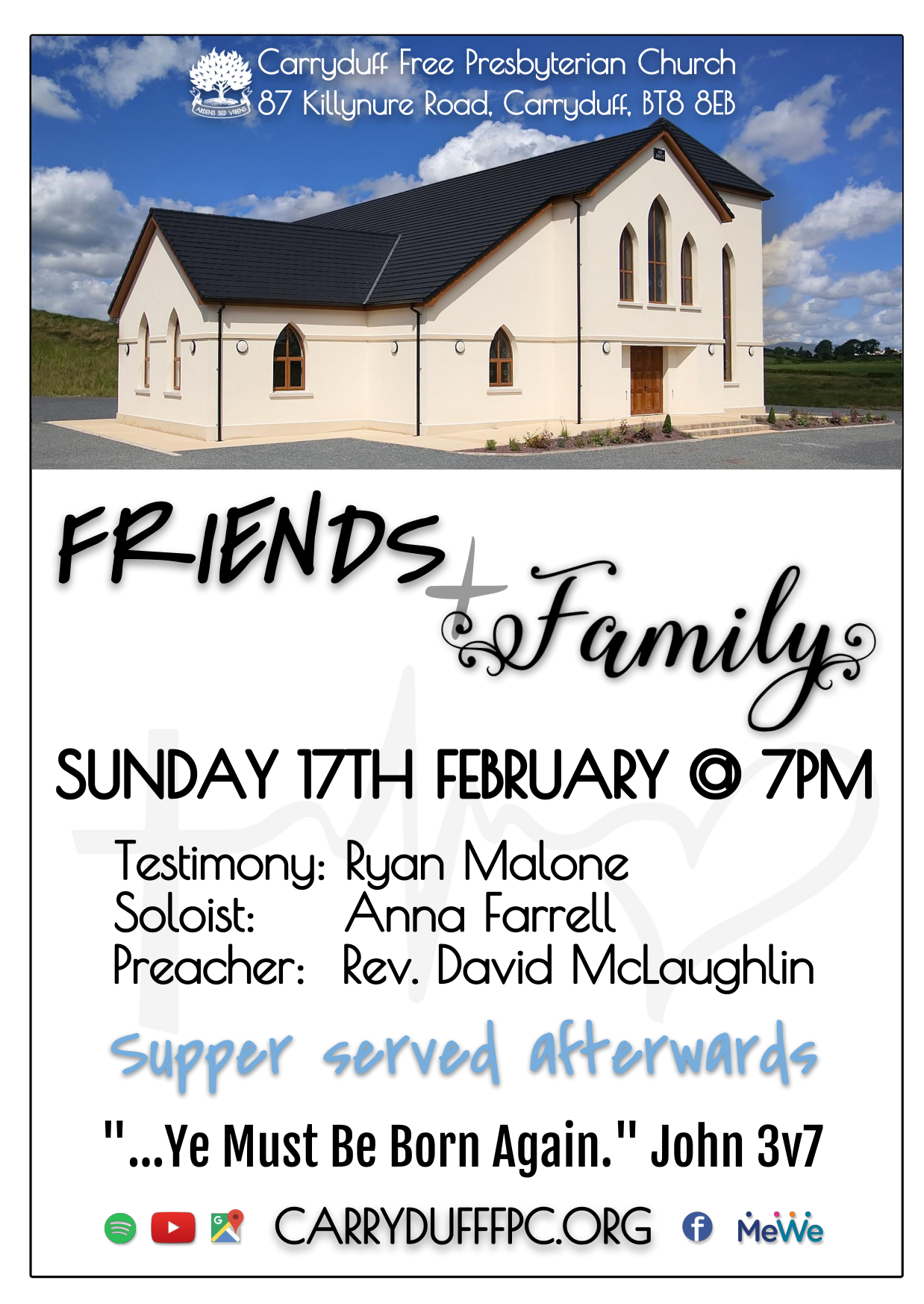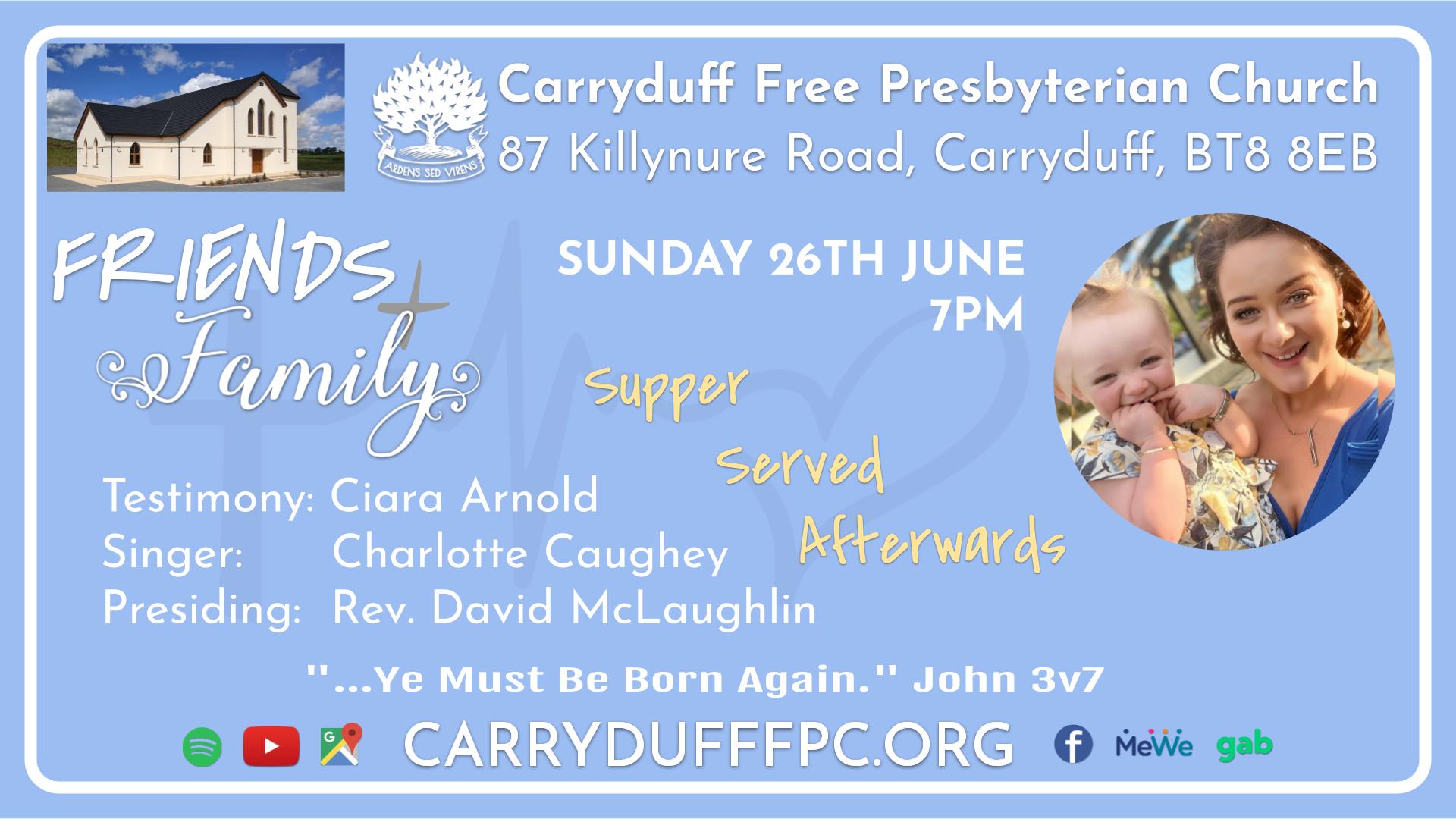Table of Contents
Our guest speaker for our February Family Night service was Rev. Colin McFarland. Rev. McFarland became a christian at the age of 9 & even as a boy wanted to be a Missionary. As a singer in a Quartet taking meetings, Colin mainly did the preaching. The Lord led him into the Belfast City Mission during the troubles & in 1974 into the Congregational Church. At 91 he’s still singing & speaking for The Lord having released 2 CDs, 1 at 85 & 1 at 90 years old.
Testimony of Rev. Colin McFarland
Personal Background and Early Faith
Colin shared that he was born and raised in the Donegall Road area of Belfast, Northern Ireland, a district known for producing “good men,” including Rev. Fred Greenfield. He attended Sunday school at Kilburn Street City Mission Hall, where, at age nine, he experienced a transformative moment of faith. During a Sunday evening meeting, he and a friend knelt with a city missionary, Mr. James Cassidy, who clearly guided them to accept the Lord Jesus Christ as their personal Saviour. Colin described this moment as profoundly clear, recognizing himself as a sinner needing to trust in Jesus. This early conversion shaped his life, and despite teenage challenges, he remained steadfast on the “straight and narrow road” through God’s guidance.
Ministry in Belfast City Mission
Rev. McFarland’s calling led him to join the Belfast City Mission, serving in various districts. He spent six years in McClure Street in the Ormeau Road area before being appointed to the Shankill Road in 1965, during the Troubles. He served there for nearly nine years, a time marked by violence, including bombings and shootings. Rev. McFarland highlighted the unique opportunity this presented for ministry, as people were deeply affected. He emphasized a pastor’s role as not just preaching but living alongside the community, sharing burdens, and praying with them rather than just for them. During this time, he led “many, many” people in the Shankill Road area to faith in Jesus Christ.
Pastoral Ministry and Church Leadership
Rev. McFarland’s ministry extended beyond the City Mission when he was called to serve as pastor of Coleraine Congregational Church, where he first met the speaker, David. His tenure there was marked by God’s blessing, with many coming to know Jesus as their Saviour. He described himself humbly as “God’s man in God’s time,” a link in God’s chain, acknowledging his unworthiness to be called a servant, akin to the prodigal son’s humility. After 16 years in Coleraine, Rev. McFarland served nine years at Bangor Congregational Church, followed by four and a half years in Carrickfergus, and then three years at Connsbrook Avenue Congregational Church. Even after retiring, he filled in at Ards Congregational Church when they lacked a pastor. Colin described this busy life as an “adventure for God,” encouraging young people to view their Christian lives similarly, giving everything to God without reservation.
Sermon on the Dying Thief (Luke 23:32–43)
The core of Rev. McFarland’s message was a sermon based on Luke 23:32–43, focusing on the crucifixion of Jesus alongside two thieves. He framed his message around three dying men: Jesus and the two malefactors. Colin drew a parallel to a recent television report of three Jewish men released from captivity amidst a mocking crowd, illustrating the scorn Jesus faced. He emphasized Jesus’ central position on the cross, urging believers to keep Christ at the centre of their lives.
Rev. McFarland structured his sermon around three “R”s related to the repentant thief:
- Remembered: The thief remembered there was a God, contrasting with today’s atheistic society where many live and die without acknowledging God. Colin reflected on a time in Belfast when even non-believers respected Sunday as a church day, contrasting it with the current lack of fear of God.
- Realised: The thief realised he was a sinner, acknowledging his just condemnation. Rev. McFarland shared a personal anecdote about Robert McGladdery, the last man hanged in Northern Ireland, whom he knew as a boy. McGladdery, convicted of murdering a young girl, confessed his guilt and professed faith in Christ before execution, a story Colin’s aunt shared through letters from him.
- Reckoned: The thief reckoned he deserved his punishment, unlike those who believe good works earn salvation. Rev. McFarland stressed Jesus as the only way to salvation (John 14:6), recalling his own salvation at nine, trusting Jesus as “the way, the truth, and the life.”
The repentant thief’s plea, “Lord, remember me,” was met with Jesus’ promise of paradise, highlighting Christ’s grace. Colin contrasted the doubting thief’s “if” with the repentant’s certain “Lord.” He emphasized that Jesus died for all, quoting Mrs. Alexander’s hymn to underscore salvation through Christ’s blood.
Personal Health and Urgency of Salvation
Colin revealed he has cancer and lives day by day, uncertain of his remaining time. He connected this to the Lord’s Prayer, emphasizing living “this day” by faith. He urged the congregation not to delay trusting Christ, citing the repentant thief’s realization that he was in his last hour, looking to Jesus as his only hope, preparing for his eternal home. Our dear friend Colin shared a recent encounter with a 77-year-old man he taught in Sunday school decades ago, who was confused about his faith and unsure if Jesus had entered his heart. Rev. McFarland used this to underscore the certainty of salvation through Revelation 3:20, encouraging the congregation to know Christ personally.
Call to Action and Legacy
Rev. McFarland concluded by urging anyone unsure of their salvation to speak with their pastor and trust Christ, emphasizing that Jesus, risen from the dead, is returning for His own. He warned against being unprepared, like the foolish virgins in Matthew 25, who looked the part but lacked readiness. The speaker closed by thanking our dear friend Colin for his testimony and ministry, noting that under his influence in Coleraine, three individuals—his son Colin (who worked with the Jewish Mission in Israel), Paul Acheson (now in Ards Congregational Church), and the speaker himself—were called to spread the Gospel.
Key Themes
Colin’s testimony presented his life as an adventure for God, marked by early faith, steadfast service through challenging times, and a commitment to pointing others to Christ. His sermon emphasized the urgency of salvation, the centrality of Jesus, and the necessity of personal faith over reliance on good works or church attendance. Rev. McFarland’s humility, gratitude for God’s guidance, and passion for souls shone through, leaving the congregation with a clear call to trust Jesus as the only way to salvation.
Video Broadcast of the Service
Photos
Testimony Transcript
DAVID McLAUGHLIN: We are delighted tonight not only to see you and to have fellowship with you, but we are especially delighted to have our dear friend, Reverend McFarland, with us. We go way back, as I’ve said. We first met after I was converted at 18, and we just want to thank him for coming here tonight. We’re looking forward to his ministry, whatever he shares, whether it’s testimony or preaching from the Word of God. We know, as Reverend Greenfield said—and we thank you for those words—that Reverend Greenfield is a lovely man of God. You can testify to that; his family knows it, his friends know it, and those of you meeting him for the first time will know it as well. The Lord bless you for it. Thank you.
COLIN McFARLAND: First of all, may I say it’s lovely to be with you tonight. I have a bit of a cold tonight, but it’s lovely to meet again with David. He was kind enough to visit me on a couple of occasions fairly recently, and it was lovely to renew fellowship once more and to see your pastor in his church here. It’s lovely to be with you. I was born and brought up in Belfast, in the Donegall Road area of the city. A lot of good men came from there—I mean, Freddy came from there, so he did, you know, so there must be a few others as well. Anyway, I grew up there and went to Sunday school in Kilburn Street City Mission Hall. At the age of nine, I trusted the Lord Jesus as my own and personal Saviour. Amen. It was as clear to me that night as if you tried to explain it to me tonight. I knew exactly what I needed to do: I was a sinner, and I needed to come and accept the Lord Jesus Christ as my own and personal Saviour. Along with another chum of mine that night, we knelt down with the city missionary, Mr James Cassidy, and he pointed us very simply and clearly to the Lord Jesus Christ.
Since then, I went on—it was awkward and difficult, as the teenage years are, but nevertheless, the Lord kept me on that straight and narrow road all the time. Eventually, I went onto the staff of the Belfast City Mission myself and was appointed to a place you may have heard of: Shankill Road. Especially during the Troubles, I went there in 1965 and was there for nearly nine years. I had been six years in another district before that, in McClure Street in the Ormeau Road. Nevertheless, there were tremendous opportunities, even during the Troubles. People were greatly affected by the bombings and shootings, and it was an opportunity for a city missionary to be there with the people. That’s what a real pastor is: he’s not just preaching to you, he’s living with you and sharing with you, sharing all the problems and burdens, and together, just taking them to the Lord in prayer. Do you know there’s something better than praying for people? Do you know what that is? Praying with people—that’s better. That’s what the pastor does: prays with his people. I had the privilege of pointing many, many people in the Shankill Road area to the Lord Jesus Christ as Saviour.
I got a call to a church—one of my members in the mission, a lady, actually predicted it. She said, “You know, they’ll be after you soon.” Sure enough, I got a call to Coleraine Congregational Church, and that’s where David and I first met. The Lord blessed mightily there, and a lot of people came to know the Lord Jesus as their own and personal Saviour. I was just God’s man in God’s time—that’s all any of us are. We’re only links in the chain at our very best. Who was it that said he was unworthy to be called a son? The prodigal said that, I think. Even a pastor feels at times he’s unworthy to be called a servant, and yet that’s what you’re called to be: to serve the Lord. I had the joy and privilege of serving the Lord over 16 years in Coleraine, and then I went to Bangor for nine years to the Congregational Church there. I retired from there, and the next day, I started in Carrickfergus and stayed there for four and a half years. I retired from there and started in Connsbrook Avenue Congregational Church for another three years. I retired from there and went to live in Bangor, but went to worship in the Ards Congregational Church. When they had no pastor, I filled in again there. So, it’s been a busy life, but friends, it’s an adventure for God. Amen. I would encourage any young people here tonight to treat your life as a Christian as an adventure with God. Go with God, don’t hold back anything, give Him everything, and it’s something you’ll never regret.
Now, I noticed that you are good Free Presbyterians because there’s not a clock here to be seen. I just want to share something with you from the Word of God. Is Freddy going to sing first, or no? You’re going to sing after, okay. Just something from the Word of God—this is from the Gospel According to St Luke, chapter 23, verse 32:
“And there were also two others, malefactors, led with Jesus to be put to death. And when they were come to the place which is called Calvary, there they crucified Him, and the malefactors, one on the right hand, and the other on the left. Then said Jesus, Father, forgive them; for they know not what they do. And they parted His raiment and cast lots. And the people stood beholding. And the rulers also with them derided Him, saying, He saved others; let Him save Himself, if He be the Christ, the chosen of God. And the soldiers also mocked Him, coming to Him, and offering Him vinegar, and saying, If thou be the king of the Jews, save thyself. The superscription also was written over Him in the letters of Greek, and Latin, and Hebrew, THIS IS THE KING OF THE JEWS. And one of the malefactors which were hanged railed on Him, saying, If thou be the Christ, save thyself and us. And you’ll notice he said, If thou be the Christ, save thyself and us. But the other answering rebuked him, saying, Dost not thou also fear God, seeing that thou art in the same condemnation? And we indeed justly; for we receive the due reward of our deeds: but this man hath done nothing amiss. And he said unto Jesus, Lord, remember me when thou comest into thy kingdom. And Jesus said unto him, Verily I say unto thee, today shalt thou be with me in paradise.”
May God add His own blessing to the reading of His holy Word.
I want to tell you a story about three dying men. I watched television last Saturday when three Jewish men were in the hands of Hamas, but they were being released. They were led through a crowd of people who mocked, cheered, blasphemed, and laughed. There weren’t many people that day who were crying to see them go. Nevertheless, they were being freed. I want to talk about three men—they were prisoners, condemned, and on their way to be crucified: the Lord Jesus and two thieves. They crucified them, and the crowd was laughing, mocking, spitting, doing everything but venerating the very Son of God. They carried those crosses and got to the place where they were placed upon them, their arms stretched out and nailed to the crosses. Jesus was in the centre cross—isn’t that wonderful how perfectly the Word of God works out? Jesus was in the centre. He should always be in the centre of our lives, friends. If you know Him as your Saviour, keep Him in the centre. Don’t push Him to the side at any time. Keep Him in the centre—you’ll never regret it. The Lord will bless you for it.
One thief was on one side, and one on the other side of the Lord Jesus. There they were, and one thief said, “If thou be the Son of God, if thou be the Christ, the Messiah, get down off the cross and save thyself and us.” Of course, it was a very selfish demand, wasn’t it? Unquestionably, you’ll never be saved if you have an “if,” if you have any doubt about trusting the one who’s on the middle cross, friends—you’ll never be saved. But if you do away with the doubts, like the other thief on the other side, he said, “Lord.” He didn’t say “if.” He’d already made up his mind that this was the Lord.
I want to give you three “R”s now—I’m not going to keep you for three hours, but just something that comes under the letter “R.” First of all, this dying thief, as we call him, remembered that there was a God. A lot of people today have forgotten there is a God, and they live like it, and sadly, they die like it as well. They don’t believe in God. We’re in an atheistic society today. I used to go around the doors many years ago in the City Mission and in the churches, and you were accepted. Nobody would have shut the door in your face. They might have politely declined, but at least they heard you, listened to what you had to say for a minute or two. Now they would tell you just where to go. They would call the police on you, have you arrested for annoying them. It’s because there is no fear of God in their eyes.
I remember a time, as Freddy was alluding to, years ago in that very district where we lived. Nobody washed their car on a Sunday—nobody had a car there anyway to wash, but when they did get them, they never would have done it on a Sunday. The shoes were polished on Saturday, ready for Sunday to go to church. The crowds would be seen walking up the road with their Bible, even if they weren’t believers. There was a sense of God in the community. We haven’t got that now—it’s the opposite. This man remembered that there was a God. Have you had a dealing with God at all? Oh, I thank God for that time when I had that experience and that dealing with God. God spoke to me quietly, and my friend, in that adult meeting that Sunday evening as children, we trusted Christ. There was no “if” in our minds. We knew there was a God; we remembered there was a God.
The second thing that this dying thief realised was that he was a sinner. He says, “We’re here because we have done wrong. We have been condemned for what we have done.” He realised he was a sinner, and he was going to have to meet that God someday. How would he fare then? I knew the last man to be hanged in Northern Ireland. I knew him when we were boys together. I was evacuated during the war to a wee village called Devenish, outside Newry, just a mile outside Newry. He lived in the same row of houses that I was evacuated to. I called the people we lived with “aunt” because they were friends of friends of ours, and they were so close to us, warm, and welcoming. I loved staying there. But Robert McGladdery lived further up, and he murdered a young girl called Pearl Gamble. She was only 19, I think, at the time. I well remember Robert—he had a reputation, even in the village, of being a bad boy. But my aunt, who I stayed with, when he was in prison, went to see him. She got permission on a couple of occasions to call and see him in the condemned cell he was in at that time. He was just waiting to be hanged.
My aunt was a Christian and taught in her brother’s Sunday school. She talked to Robert, and after he was hanged, she received a couple of letters that he had written to her. He wasn’t allowed to correspond while he was in a condemned cell, but afterwards, the letters were forwarded to her. In one of them that I read—she let me read it—he said he faced a judge here on earth, and while he pleaded he was innocent, he knew within his heart he was guilty. He said, “I know that I have to face a heavenly judge, and I can’t plead that I’m innocent. I know I’m guilty.” In it, he said how he sent for an evangelist who was working in the area at the time, and he made a profession of faith in the Lord Jesus Christ. I only hope it was genuine and true—it’s only the Lord and him that know that. We don’t; we take his word for it. But he realised that he was a sinner, just like this dying thief realised he was a sinner.
The third “R,” as it were: he reckoned he deserved what he was getting. Some people, when they think about heaven, say, “Well, do you really need to be saved? I mean, I’ve lived a good, clean life all my life, never done anybody any harm, done the best that I could. I’ve helped my neighbours, I’ve done this, that, and the other. I went to church every Sunday, no matter what church it was.” They feel that somehow or other, God will let them slip into heaven, whether it’s a side door or not, they might think. But I know there’s not. Jesus said, “I am the way, the truth, and the life: no man cometh unto the Father, but by me.” That’s a text I remembered the night I was saved—John 14:6. Jesus was the way, not a way—the way, the truth, and the life. That night, I trusted in that one who was the way.
This thief reckoned that he deserved what he was getting. He said to his friend on the other cross, on the other side of Jesus, “Do you not think about God? Do you not think about meeting God? Do you not realise that we’re here because of what we have done? But this man…” And this is the man we want to talk about tonight, the one who was on the centre cross—we don’t leave Him out. That man turned to Jesus and said, “Lord, remember me.” Oh, the Lord would never forget him anyway. And He said, “Today thou shalt be with me in paradise.” Why? Because he turned and repented of all he had done. He remembered about God, he realised he was a sinner, he reckoned he was getting justice—justice was going to punish him. He got justice; it was fair what he was getting, being crucified. But he said, “This man hath done nothing amiss.”
What did he say about this man? Well, they said this man went about everywhere doing good. He healed the lepers, gave sight to the blind, healed the lame, helped the widows, and did everything that was good. That’s this man. But why was that man there? The others were there because they deserved to be there. Why was this man there? He was there not because of anything He had done, but for everything they had done—and listen, friends, for everything you and I have done as well. No matter what it is, no matter how heinous our sins have been, the Lord Jesus Christ died on that cross. Mrs Alexander, the wife of the late Bishop Alexander of Japan, wrote those beautiful words to try and teach the children in the church about the Lord Jesus Christ:
“He died that we might be forgiven,
He died to make us good,
That we might go at last to heaven,
Saved by His precious blood.”
Friends, there’s no other way. Have you ever come that way? Well, I trust you have. But maybe you’re here tonight and say, “I’m not sure.” Friends, you need to be sure.
Freddy, I met a man that I taught in Sunday school as well, a real while ago. He called in with me one day. I gave him my address—we met by what we might say was accident, but I think it was God’s plan. When he saw me and heard the name, he said, “Are you a minister?” I said, “Yes.” He said, “You taught me in Sunday school.” My friends, this was something like 67 or 68 years ago. No, Freddy, he’s not near that age at all, you know. But this was another chap who lived just in Tavanagh Street, very near where Freddy lived, two doors away. He came, and he’s a very mixed-up man. I’ve never met anybody so confused by all that has happened in his life in the past, and it hasn’t been a good life by any means. He said during the course of our conversation, “I have asked the Lord into my heart.” I simply said to him, “And did He come in? Did He come in?” He said, “I don’t know.”
The Word of God tells me in Revelation 3:20, where it says descriptively of the Lord Jesus, “Behold, I stand at the door, and knock: and if any man hear my voice, and open the door, I will come in to him, and will sup with him, and he with me.” Your man was silent. But he came back just a couple of days ago and stayed with me four hours the first day—boy, was I tired after it. He only stayed two hours the other day. I think he’s getting the message a bit, you know. But it’s the other message that I hope he’s getting: the message that he needs to be saved. A man, 77 years of age, and he needs to come and trust the Lord Jesus. You don’t have to be old to trust Him—I trusted Him when I was very young. A few young people have done it—you trusted the Lord. You older folk, don’t wait till the last minute.
In relation to this dying thief, there was something else that he realised: he was living in his last hour. He knew there he was, hanging on a cross, and he was dying. He knew he had just a short time. If you realised you had just a short time, what would you do? Friends, I have cancer. I don’t know how long my time is. They’re not doing anything about it—they would only lose me on the table if they tried to operate, they said. I never asked how long they thought I might have. But I know this: I’m just living from day to day. That’s the way we do live as a Christian. What did the Lord Jesus teach those disciples to say? “Give us this day our daily bread”—not for this week or the next month, just this day. We live, friends, one day at a time.
He realised he was living in his last hour. But not only that, as he looked across at Jesus—and I believe the crosses must have been placed in such a way that he could still look to the side somehow or other and see Jesus—when he said, “Lord, remember me,” he was looking at his last hope. The last hope that he had was that man on the centre cross. Friends, it’s not only your last hope, it’s your only hope. If you haven’t trusted Him, He’s the way, the truth, and the life. He was living in his last hour, looking at his last hope, and, friends, he was leaving for his last home. Where was he going? He knew in his own heart and in his mind and his life. They say that when you’re dying, everything flashes before you—your whole life just comes before you. His flashed before him, and he realised he was a lost sinner. He was living in his last hour, looking at his last hope, and he was leaving for his last home. That’s why he turned to the man on the centre cross, the Lord Jesus Christ.
Oh, friends, I cannot recommend Him enough. If you haven’t trusted Him before, speak to your pastor tonight and get right with God. Remember, He’s not on the cross anymore. He rose from the dead, praise God, and He’s coming back again someday for His own. Would you be caught up, or caught on, or caught out—not ready? Remember those ten virgins who were to be helpers at the wedding: five were wise, and five were foolish. The five foolish ones, well, they might have been dressed all right, looked the part, but their lamps weren’t trimmed. This was all part of the necessity of the whole set-up, and they hadn’t made full preparation. Friends, have you made full preparation, or are you making a fool’s preparation, just counting on your good works, doing your best, depending on your church, no matter what church it is? Your pastor would tell you that you need to come the one way, and that is through the Lord Jesus Christ. Oh, trust Him tonight. May God bless you. Amen.
Thank you, Reverend McFarland, very much for bringing to us that word of testimony, that very clear message. As he has outlined it for us, it leaves us with one question: do you know the Lord Jesus Christ as your own and personal Saviour? He is the only way, the only truth, the only life. But you need to know Him, not just know about Him—you need to know Him personally. Have you heard?
[Music]
Take your load of care,
Are you soul-weary,
Seek rest from the burden you bear.
Do you know my Jesus,
Do you know, oh my friend,
Have you heard how He loves you,
And He’ll abide to the end.
He knows your good and your woe,
He hears His child’s cry.
He understands all your heartaches,
And He’ll wipe the tears from your eyes.
Do you know my Jesus,
Do you know, oh my friend,
Have you heard He loves you,
And He will abide to the end.
[Music]
DAVID McLAUGHLIN: We want to sing in closing, and just before we do, on your behalf, I want to thank personally Reverend McFarland for coming tonight—not only for the testimony but for the ministry of God’s Word. It’s been so sweet. As I think about it, I think about the days of Coleraine, the Congregational Church. There were three of us: his own son, Colin, went into work with the Jewish Mission, isn’t that right? Yes, over in Israel. Then there was Paul Acheson, Mr Ken Acheson’s son, Paul, who’s now in the Congregational Church in Ards—is that right? Is it Newtownards or Ards? And I’m here. So, under this man, God raised up three others who would go and take the Gospel. We thank him so much. We’re really humbled, we’re delighted he’s been here, and it’s been such a blessing to listen to God’s Word.
Podcast
Subscribe to the podcast here:
Spotify Podcasts | Apple Podcasts | Pocket Casts
Email | RSS | more information here




